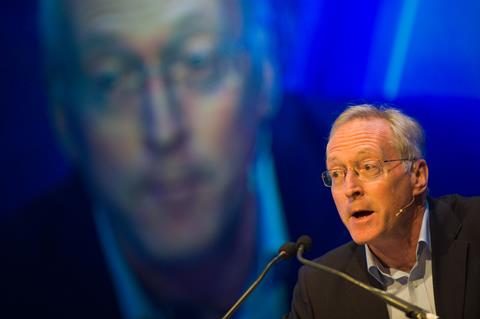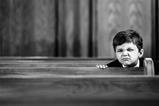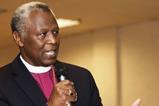The eminent church historian seems unable or unwilling to properly engage with Christians who think differently to him, observes Tim Wyatt

Diarmaid MacCulloch is perhaps the leading church historian of his generation. A few years ago he retired from teaching at the University of Oxford, and so set to a breezy and light retirement project - a 700-page book about the history of Christianity and sex. Lower Than The Angels is now out and MacCulloch has been busily doing interviews to promote it.
As well as being a highly regarded academic, MacCulloch has a fascinating personal story with the church. The son of a vicar, he himself felt called to the priesthood in his 20s, dutifully trained and was ordained deacon (the first step on the clerical ladder). But when it came time to upgrade him to priest a year later (something which is normally an automatic tick box exercise), there was a ruckus because he made no secret of the fact he was gay and in a relationship with a man.
Of course, there have been gay (sometimes single, sometimes partnered) clergy for probably as long as there has been a church, but MacCulloch was unusual at the time for being entirely up front about this, both in the media and to the church authorities. Unwilling to commit to a life of celibacy or secrecy, he abandoned his clerical career and devoted himself to history instead. He has since described himself as a “candid friend” of the church, no longer able to sign up to doctrinal statements of belief but fond of its culture.
So, he comes at this topic with baggage (as we all must do). But what is most interesting to me in reading his recent round of interviews is to discover that such a dazzlingly intelligent and perceptive man is still as locked into the tribal siloes as any other player in the endless internal culture wars of the church.
It comes through clearly in a lengthy interview he did with The Guardian, which reported, “He also understood from his father what, he says, should be obvious to any half-intelligent reader of the Bible, that the book was a kind of ‘cacophonous library’ of competing voices rather than any strict gospel truth. ‘How anyone could have mistaken it for the word of God baffles me,’ he says. ‘And there’s obviously an intellectual dishonesty about that.’”
He also states categorically that Jesus never mentions sexuality in the gospels, so it clearly “wasn’t a big deal for him”, which seems to strain credulity given Jesus’s teaching on marriage in Matthew 19. He fulminates against the “detestable” Alpha course, and darkly presumes many Anglican evangelicals are ciphers of the conservative Diocese of Sydney in Australia.
Of course, the theological disagreements between me - a churchgoing evangelical - and MacCulloch - a lapsed liberal - are always going to be vast. That much is to be expected. But what I am surprised about is someone who has always adopted an eirenic air towards the church, and rarely got involved in its endless fights over sexuality, is still so clueless (and quite poisonous) towards his ostensible conservative and evangelical opponents.
Contrary to MacCulloch, conservative Christians really do believe the Bible is the word of God. You can disagree with that position and think they are wrong, but they aren’t faking it. It’s not intrinsically “dishonest” to hold a conviction that the Bible is God’s word, a conviction which MacCulloch knows is one which the vast majority of all Christians have held throughout history. He may think he knows better having studied the origins of the scripture, fine. But he must also know there are entire libraries of weighty works of theology and history by serious Christian academics who make the other case. This is not intellectually dishonest - this is just disagreement.
You can strongly dislike HTB-style evangelicals, but must we call the Alpha course they developed “detestable”? Does that really come from MacCulloch’s considered lengthy theological assessment of Alpha? Or is it another lazy swipe at a tribe in the church he doesn’t like?
MacCulloch does not hold a monopoly on thinking hard about sex in the church
As it happens, a few years ago I read and hugely enjoyed MacCulloch’s magnus opus, his 1,100-page History of Christianity. I learned a lot. In places, it was quite a challenging read for a believing Christian, as he assembled evidence to make the case for the decidedly non-divine origins of my faith. But it was worth persevering with and critically engaging with his years of research, even when they came to some troubling conclusions.
It’s a real shame MacCulloch isn’t prepared to offer similar charity to his opponents in the church on the issue of sexuality. Yes, the church has a lengthy and depressing history on this subject and his book recounts many episodes, beliefs and practices which would horrify even the most hardened anti-LGBT Christian today. No doubt this shapes his approach.
But it does seem like he’s got a bit stuck in the trenches and is unable (or unwilling) to see clearly the other side. The conservatives, like everyone, have many flaws - but they are not the malevolent and ignorant caricature MacCulloch presents. And despite his airy dismissal of the entire Living in Love and Faith (LLF) project, he does not hold a monopoly on thinking hard about sex in the church. LLF tried to dig into expert academic theological, scientific and sociological research about sex and marriage and produced resources exploring various Christian perspectives.
Part of the reason, I think, this debate has become so bitter and so divisive is because far too many of the protagonists are unable or unwilling to really try to get into the heads and hearts of the other side. If even a figure as removed from the fray as MacCulloch can fall prey to lazy and ignorant stereotypes, this malaise may go even deeper than I feared.































5 Readers' comments